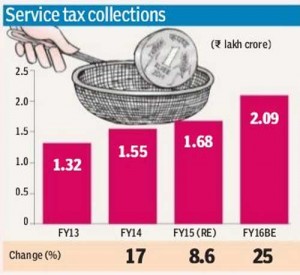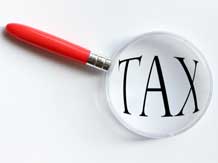In this blog post, Mrinal Litoria, a student pursuing his BA LLB from the Rajiv Gandhi National University of Law, Patiala and a Diploma in Entrepreneurship Administration and Business Laws from NUJS, Kolkata, describes the levying of service tax on educational courses.

Service tax is levied under section 66B of the Finance Act 1994 on “service” other than services enumerated in the negative list. Also, by the power given to the central government by section 93 of the Act, any service, which is not on the negative list, may be exempted by way of issuing a notification to this effect. Therefore an activity which comes under the purview of the definition of service is not covered under the negative list and also is not expressly exempted by the central government, will bear the levy of service tax.
Service
Service is an “activity carried out by a person for another for consideration”.[1]
In the context of educational courses and services the Central Board of Excise and Customs, under Department of Revenue (Ministry of Finance), has explained the meaning of ‘activity for consideration’ as follows-
“The concept of ‘activity for consideration’ involves an element of contractual relationship wherein the person doing an activity does so at the desire of the person for whom the activity is done in exchange for consideration. An activity is done without such a relationship would not be an ‘activity for consideration’ even though such activity may lead to accrual of gains to the person carrying out the activity”[2]…
“There can be many activities without consideration. An artist performing on a street does an activity without consideration even though passersby may drop some coins in his bowl kept after feeling either rejoiced or merely out of compassion. They are, however, under no obligation to pay any amount for listening to him nor have they engaged him for his services. On the other hand, if the same person is called to perform on payment of an amount of money then the performance becomes an activity for consideration.”[3]
Taxation of Educational Services
The operation of Chapter V (Service Tax) of Finance Act, 1994 on the education sector is affected by –
- Section 66D(l) of Finance Act, 1994[4] (Negative list).
- Notification 25/2012-ST (popularly known as the mega exemption) issued by the Government of India through Department of Revenue (Ministry of Finance).[5]
It is pertinent to note in this regard that the Finance Act, 2016 (No. 28 of 2016), by section 149, has omitted Section 66D(l) of Finance Act, 1994, but the definition provided therein has been retained in Notification NO-9/2016-Service Tax. Therefore the effect remains intact by entry 9 in the Notification 25/2012-ST, which in its updated version provides-
“9. Services provided,-
- By an educational institution to its student, faculty, and staff;
- To an educational institution, by way of,-
- Transportation of student, faculty, and staff;
- catering, including any mid-day meals scheme sponsored by the Government;
- security or cleaning or housekeeping services performed in such educational institution;
- services relating to admission to, or conduct of examination by, such institution;[6]”

The term “educational institution” is defined by notification NO-9/2016-Service Tax[7], issued on 1st March 2016, under its paragraph 1(b)(ii). It provides that-
“(ii) for clause (oa), the following shall be substituted with effect from such date on which the Finance Bill, 2016, receives the assent of the President of India, namely: –
“(oa) “educational institution” means an institution providing services by way of:
- pre-school education and education up to higher secondary school or equivalent;
- education as a part of a curriculum for obtaining a qualification recognized by any law for the time being in force;
- education as a part of an approved vocational education course;”
Therefore it can be concluded that any service related to education other than those covered under Mega Exemption and the Negative list will be subject to service tax. But it is worthwhile to note that under Entry 8 of the Mega exemption (Notification No.25/2012-ST) services by way of training or coaching in recreational activities relating to arts, culture or sports are also exempted from service tax.
Educational Institution
In the case of Sole Trustee, Loke Shikshana Trust v. CIT[8], the Hon’ble Supreme Court said that-
“education means systematic instruction, schooling or training given to the person in pursuit of education for the purpose of training and developing the knowledge, skill, mind and character.”
With this context in mind, the definition of educational institutes can include a variety of institutions and organizations under its folds. Therefore the definition may be understood as follows-
- Pre-school Education- All children between the age of 3 to 6 years come under the ambit of pre-school education[9]. It includes play schools, pre-nursery and nursery schools, crèche, day care center, pre-kindergarten or any such purpose school or center by whatever name called.
- Education up to Higher Secondary or Equivalent- includes school education which is up to higher secondary (12th standard) or equivalent level (say, intermediate). The use of the term equivalent denotes that even if an International school providing international certificate is operating in India, it would be subject to service tax.

- Education as a part of curriculum leading to recognized qualification – includes courses offered after the completion of schooling (Class 12th), the services are covered are exempted only if certain requirements are fulfilled, i.e.,
- Education must be imparted as a part of curriculum
- such education should be for obtaining a qualification (say a degree, diploma, certificate, etc.)
- such qualification should be recognized by any law (Indian law only) for the time being in force.
For the education service to avail the benefit of being in the negative list the requirements as mentioned above have to be necessarily fulfilled, only then can they get any exemption. The use of words “law for the time being in force” implies that such laws as are applicable in India at a given point of time. Education services rendering foreign qualifications shall be liable to the payment of Service Tax. It may be noted that in India recognition to and permission to start a new degree or diploma courses is granted by bodies such as University Grants Commission (UGC), All India Council for Technical Education (AICTE), etc.
- Education as part of an approved vocational education course- As per the Notification No.9/2016-ST, issued by the Central Board for Excise and Customs, Cl. (ba), under paragraph 2 of Notification No.25/2012-ST (Mega Exemption), shall provide the definition for ‘approved vocational education course’, which says-
“(ba) “approved vocational education course” means, –
- a course run by an industrial training institute or an industrial training center affiliated to the National Council for Vocational Training or State Council for Vocational Training offering courses in designated trades notified under the Apprentices Act, 1961 (52 of 1961); or
- a Modular Employable Skill Course, approved by the National Council of Vocational Training, run by a person registered with the Directorate General of Training, Ministry of Skill Development and Entrepreneurship[10];”
It is, therefore, clear that the term ‘Educational institutions’ includes a wide variety of educational courses and services offered at various levels of academics. It is to be interpreted in an abroad sense and the case of S. Azeez Basha v. Union of India[11], the term ‘educational institutions’ includes universities as well. Such interpretation in the context of Article 30 of Constitution of India, 1950, would hold true for service tax matters as well.
Conclusion
Education is the most important sector of any economy, for it is only through proper and affordable education that citizens can play a contributory part in it and not be the other way round i.e. burdensome. It is essentially appreciable that school education and recognized degree/diploma/certificate courses are exempt from service tax. However tuitions or coaching classes, other than those provided for under Entry 8 of Notification No.25/2012-ST, are chargeable to service tax (however they earlier enjoyed certain exemptions).
The term ‘educational institutions’ plays an important role in the operation of service tax on this sector. Although it has been a policy of the government to reduce exemptions as far as possible, the definition of ‘educational institutions’ after undergoing various mutilations, still has a wide application.
The central government has taken a move to omit the negative list from the Finance Act, 1994, and provide for the same in the exemption notification (No.25/2012-ST). Although no reasons have been given by the Ministry of Finance or the Central Board of Excise and Customs, it is easily understandable that any change to a provision in the Finance Act would require an amendment by the Parliament, which in turn is a hefty procedure. On the other hand, notifications like the present exemption notification can be modified or withdrawn by the government at any time.
[divider]
References:
[1] Section 65B(44) of the Finance Act 1994.
[2] Taxation of Services: An Education Guide, CBEC, June 20, 2012, Para. 2.3, pg 8.
[3] Taxation of Services: An Education Guide, CBEC, June 20, 2012, Para. 2.3, pg 8.
[4] As available on http://www.cbec.gov.in/resources//htdocs-servicetax/st-act-ason24oct2013.pdf, Last Accessed on: 30/06/2016.
[5] As available on http://www.cbec.gov.in/htdocs-servicetax/st-notifications/st-notifications-2012/st25-2012, Last accessed on 30/06/2016.
[6] As available on http://taxindiaupdates.in/mega-exemptions-notification/, Last Accessed on 30/06/2016.
[7] As available on http://www.cbec.gov.in/resources//htdocs-servicetax/st-notifications/st-notifications-2016/st09-2016.pdf, last accessed on 30/06/2016.
[8] Sole Trustee, Loke Shikshana Trust v. CIT, (1976) 1 SCC 254
[9] Women and Children Development Department, Government of Odisha, http://wcdodisha.gov.in/node/35.
[10] As available on http://www.cbec.gov.in/resources//htdocs-servicetax/st-notifications/st-notifications-2016/st09-2016.pdf, last accessed on 30/06/2016.
[11] S. Azeez Basha v. The Union of India, AIR 1968 SC 662, 670.
 Serato DJ Crack 2025Serato DJ PRO Crack
Serato DJ Crack 2025Serato DJ PRO Crack









 Allow notifications
Allow notifications



Thank You So Much Sir , Your Article Is Very Useful For Us…………..